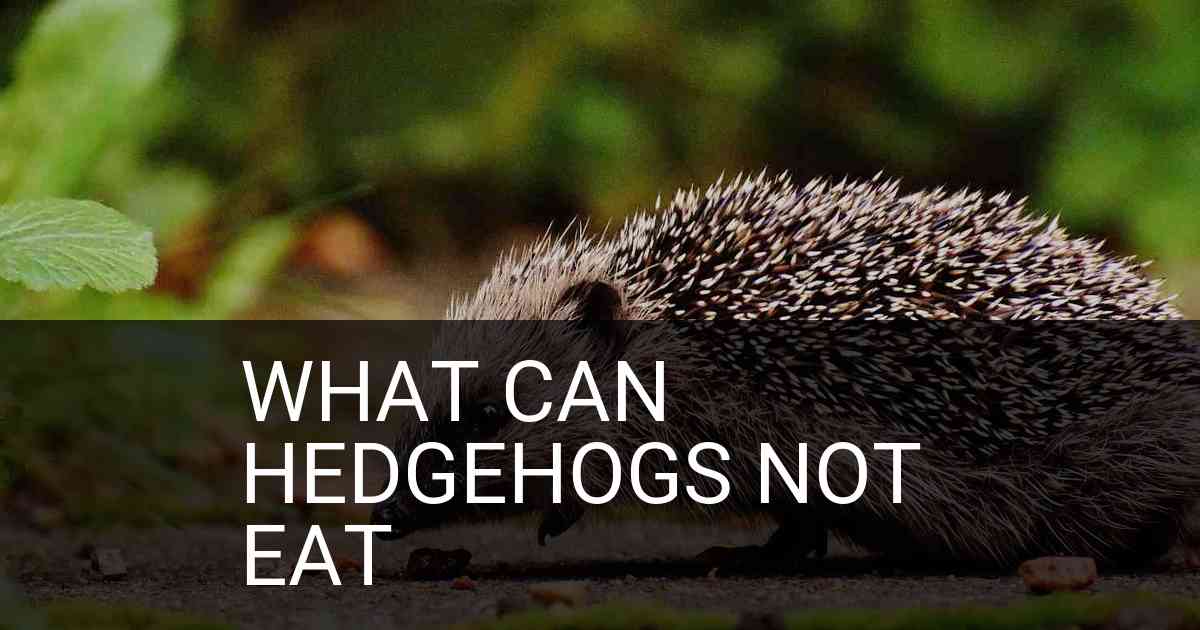
Hedgehogs are adorable, spiny little creatures that make great pets. They can be a lot of fun to care for and interact with, but it’s important to know what they should and shouldn’t eat in order to keep them healthy. In this article, we’ll explore what hedgehogs cannot eat so that you can make sure your pet is getting the proper nutrition. We’ll also look at some alternative foods they can safely enjoy as part of their diet. Read on to learn more about keeping your hedgehog happy and healthy!
What Can Hedgehogs Not Eat?
Hedgehogs should not eat most human food, as it often contains too much sugar and fat for their delicate digestive system. Foods that are particularly dangerous for hedgehogs include chocolate, alcohol, avocados, onions, garlic, spicy foods, sweets, dairy products and artificial sweeteners. In addition to these items, they also cannot eat any type of pet food intended for other animals.
Dangerous Foods For Hedgehogs
- Chocolate: Chocolate can cause indigestion in hedgehogs and may even be fatal if eaten in large quantities.
- Alcohol: Alcohol has no nutritional value and is toxic to hedgehogs.
- Avocados: The leaves and pits of avocados contain a toxin called persin which can be deadly to hedgehogs’ health.
- Onions & Garlic: Both onion and garlic contain compounds that can irritate the stomach lining of a hedgehog leading to vomiting or diarrhea.
- Spicy Foods: Spicy foods are especially irritating to the GI tract of a hedgehog so it’s best avoided altogether.
- Sweets & Sugary Treats: Sugary treats like candy or cake may seem like an innocent treat but they provide little nutritional value and can lead to obesity in your pet.
The Dangers of Feeding a Hedgehog Inappropriate Foods
Feeding your hedgehog the wrong food can be dangerous to their health, and may even cause serious illness or death. It’s important to know what type of food is safe for your pet hedgehog and which foods they should never eat. Some common inappropriate foods include:
- Fruits and Vegetables: Although fruits and vegetables are an important part of a balanced diet for humans, hedgehogs cannot digest them properly. Fruits are too high in sugar, while vegetables contain indigestible fibers that can give your pet stomach problems.
- Nuts and Seeds: Nuts and seeds contain oils that can make your hedgehog sick. Additionally, some nuts (like walnuts) are too hard for them to chew.
- Meat Products: Hedgehogs have sensitive digestive systems, so feeding them meat products like beef jerky or hot dogs can cause severe gastrointestinal distress.
- Sweets & Candy: Sweets and candy should never be fed to any animal as they are extremely unhealthy due to the high sugar content.
Health Risks Associated With Improper Diet
In addition to potential digestive issues caused by eating inappropriate foods, there are other risks associated with improper diets such as obesity, diabetes, heart disease, liver failure, kidney stones and more. A poor diet not only affects the physical health of your pet but also their mental wellbeing; if they don’t get enough nutrition they won’t be able to perform normal activities like running around or playing with toys. In extreme cases it’s possible for an improperly fed hedgehog to die from malnutrition.
Safe Human Foods for Hedgehogs to Enjoy
Hedgehogs are omnivores and their diet can be supplemented with a variety of safe human foods. The following items may safely be given to hedgehogs as occasional treats:
- Fresh Fruits: Apples, blueberries, bananas, cantaloupe, strawberries, raspberries and pears.
- Vegetables: Carrots, squash, bell peppers, sweet potatoes and green beans.
- Grains: Cooked oatmeal or quinoa.
It is important that all human food fed to hedgehogs is fresh and free of pesticides or preservatives. Most fruits and vegetables require no preparation; however some should be cooked prior to feeding. Items such as apples should be cut into small pieces before being given to the hedgehog.
When introducing new foods one at a time it is important to watch closely for any signs of digestive upset (vomiting or diarrhea). If this occurs discontinue the item immediately.
Identifying the Dietary Habits of Hedgehogs
Hedgehogs are small mammals native to Europe, Asia and Africa. While they can make wonderful pets, it is important to understand their dietary habits in order to keep them healthy. Hedgehog diets should consist of a variety of insects, vegetables and fruits.
Insects
Insects such as mealworms, crickets and cockroaches are an important part of a hedgehog’s diet. A few live insects per day will provide your pet with essential proteins and fats for optimal health.
Vegetables & Fruits
Vegetables such as kale, spinach and carrots should be offered daily in moderation. Fruits like apples or strawberries can also be given occasionally as treats.
- It is important to always remove uneaten food after 24 hours so that it does not spoil or become moldy.
- All food must be washed thoroughly before feeding your hedgehog.
Conclusion
In conclusion, it is important to keep hedgehogs safe and healthy by being aware of what they can and cannot eat. Just like any other pet, their diet should be carefully monitored to ensure that they stay healthy. While there are some foods that hedgehogs can eat, such as fruits and vegetables, there are also many foods that are dangerous for them to consume. Foods such as chocolate, caffeine, dairy products, citrus fruits, raw meats or fish and processed foods should not be given to hedgehogs under any circumstances. By following these guidelines you will help your pet live a long and happy life!

